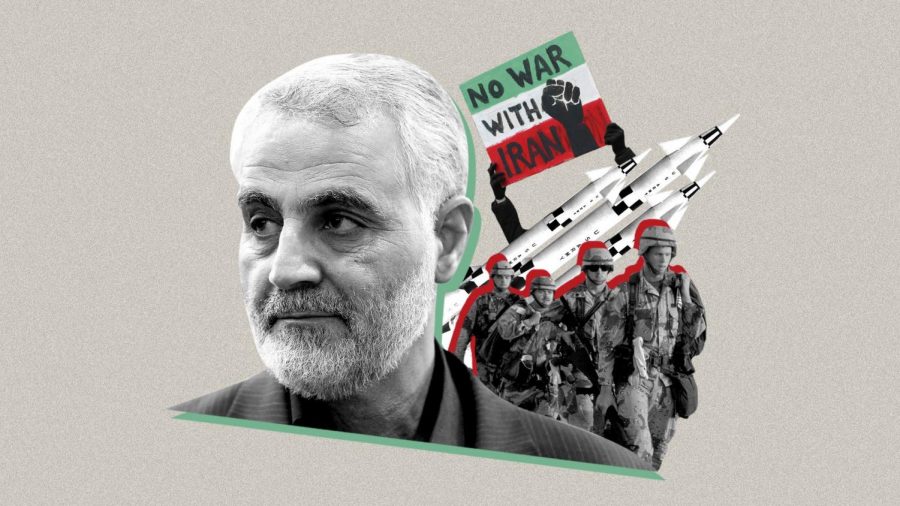The War That Wasn’t
It feels like a lifetime ago, but 25 short days ago, Iranian general Qassem Soleimani was assassinated while waiting in an airport our ally, Iraq. The United States military assassinated a foreign military official on foreign soil, the soil of our “partners in peace.” Soleimani was acting as a diplomat in a foreign county.
This diplomatic capacity is important. Say Mike Pence, the current Vice President, was on a diplomatic tour in Russia and China decided to call in an airstrike because the U.S. openly supported protests in Hong Kong. China would be blown off the face of the Earth. The measured response from Iran is incredibly impressive, given the circumstances. The United States has never been the rational actor in foreign policy calculus.
The U.S. killed their second in command, in order to retaliate against the attack of a U.S. embassy in Iraq. An attack by an anti-U.S. Iraqi militia. An attack that started as a protest. A protest that was supported by Iran. Soleimani was killed because Iran paid lip service to a protest against U.S. imperialism in Iraq that turned violent.
First, some context. In the wake of this assassination, the White House claimed that the Soleimani strike was simply because Soleimani was “planning to” attack American diplomats and embassies. This is important. Proving that American lives were in imminent danger is a crucial component to understanding what constitutes a legal preemptive strike. Of course, the strike was legal under U.S. law. In a misguided attempt not to seem “unpatriotic” Congress has essentially deferred to the executive on all foreign military interventions since the Vietnam War.
This does not include international law. Current international law (although the U.S. fails to observe its relevance or jurisdiction by not admitting itself to the ICC, the enforcement mechanism of all international law) says that unless there is imminent threats against U.S. diplomatic or military targets, presented specifically by Soleimani’s continued survival, then the assassination was unlawful.
The Trump Administration then admitted that the imminent danger component of their assassination defense was a lie, and that they killed him because they wanted to, or because they wanted to “protect U.S. interests abroad.” Hold on let me translate that out of DoD-speak for you. Ok I’ve got it. “Protect U.S. interests abroad” translates to “he wasn’t playing nice and giving us his oil fields, so we killed him in the hopes that the next guy in his shoes will learn the lesson and give us a taste of that sweet black gold.”
Now you might be thinking “Hey! It’s 2020! What are Trump’s challengers saying about this unlawful and immoral act of war?” I’m glad you asked. Well not really glad but I’ll get into that later. First let’s talk about the response from ambitious boy wunderkind who sold his soul to success and is constantly self-absorbed in a sense of moral duty that is completely fabricated because he killed the part of himself that feels shame and joy but also your grandpappy just loves how he talks about the economy: Pete Boot Edge Edge. The South Bend Mayor, and adult man who just wants to be the line leader, released a statement saying essentially that he wished Trump would have notified Congress before he put the palm of his hand on the geopolitical scale and pushed as hard as he could, but ultimately thought that the strike was a good idea.
Similar statements were released by the so-called moderate wing of the party, such as Klobuchar, Biden and of course, America’s “cool step-dad” who says it’s ok if you drink, as long as he’s around, Tom Steyer. All the while, Iran began striking military installations in Iraq and Trump instantly unleashed a tweetstorm about how he intends to bomb historical mosques and cultural centers (which, by the way, is an egregious war crime). FILE UNDER TRUMP TWEETS FOR HIS TRIAL AT THE HAGUE. As Trump rode the escalation escalator, (he’s not a big fan of walking, much less climbing a ladder) Democrats did their usual hand wringing, softly praying for the return of norms and institutions as they slap a Centrists for Klobuchar sticker on their car and anxiously chug a kombucha. All except for one independent.
No, I’m not talking about Michael Bloomberg. Who is ever talking about Michael Bloomberg? Of course, I’m talking about Bernard Sanders, the Independent Senator from Vermont since Vermont was just dinosaurs and maple syrup factories. (Sanders actually championed the first labor protections for maple-syrup-working dinosaurs, and even walked the picket lines with a pancake-o-saurus, when they went on strike to get paid a living wage.) He was the first and only candidate for the White House who called the Soleimani strike what it was, an assassination on morally unjustifiable grounds, going further by saying he would not have done the strike.
While the rest of the Democratic field sold this as a win for Trump, Sanders took a different tack, saying that the chaos in the current Administration is no reason to send a generation of Americans into new endless wars, after Trump ran on pulling out of the endless wars. This is one of many reasons it’s Bernie or die. When you look to foreign policy, Boot Edge Edge, Warren, and Biden will all break what little peace we have in the Middle East, by supporting U.S. imperialist expansion without any regard for the human or geopolitical cost to this expansion. While candidates like Boot Edge Edge and Gabbard, both veterans of the American forever war, have promised to pull U.S. boots off the ground on day one of their administrations. The Soleimani strike proves that even if Boot Edge Edge and Gabbard pull U.S. military personnel out of the Middle East, they will continue the dronification of state violence, with horror and bloodshed as its penchant. Bernie is the only peace candidate. This is why it is Bernie or die, no undue apocalypticism about it whatsoever.
All of the other candidates have sketched out a new kind of war, one predicated on false neutrality and fundamentally misuses the American anti-war sentiment to push forward into the proxy wars of the digital age. The war is between American robots and people living in the global peripheries. Preventing this mutation should be the touchstone of all popular Democratic anti-war sentiment, but the modern day Democratic party is moored down in the past, and still making policy decisions based on the 2002 ideology of American chauvinistic world-conquering attitudes. To move forward in foreign policy, you have to back the U.S. out of all hegemony roles. Otherwise the cycle of violence and political tumult will regenerate and mutate to be more powerfully destructive every time.
Young people don’t care. This is what is often said about my generation. And maybe they are not tapped in to the nuances of the U.S.’s shameful tendency towards fostering instability and death. But if there’s one thing they do care about, it’s not getting drafted to go to Iran.
After the Qassem Soleimani Assassination every platform of social media that is currently enjoying popularity, from Tiktok to Twitter, saw World War 3 memes spread like the Australian bushfires. While my generation might not have been informed by think tanks and public policy experts, many of these jokes were made at the expense of the U.S.’s enumerable imperial endeavors. These memes had a deeply ironic view of nationalism and patriotism in America.
These memes range from people who are rooting for the Quds Force (the Iranian equivalent to the DoD) to win the war, to very humanistic memes that simply hope nobody is hurt in this ludicrous escalation. The proliferate growth and dissemination of these memes illustrates two things very clearly: 1) there is a great sense of morbidity and nihilism in these images and depictions, showing a scar in the psyche of millenials and Gen Zers, at least partially due to the War in Iraq. 2) there is a great level of dissatisfaction and distrust of the U.S. military and their proxies, also likely due to the Iraq War. While these violent exploits are often not directly dealt with in these images, it is clear that the younger contingent of the American public does not share this bellicosity with their elected leaders. Maybe this is because the average American has more in common with the average Iranian than they do with American billionaires.

Hello! My name is Joey Schafer. I am a columnist, reporter, and law blogger, and I am also Content Manager. This is my third year on the Storm Alert Staff!
Follow...












Caden Connealy • Jan 28, 2020 at 6:25 pm
This is simply not epic